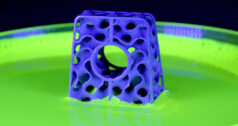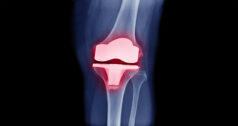
Sensor technologies have evolved to gain prominence in orthopedics, as manufacturers have developed products that allow surgeons to leverage patient data in and out of the operating room. Since early December, three orthopedic companies have made strategic announcements that will enable them to expand sensor technology in joint replacement.
Stryker acquired OrthoSensor, Exactech acquired Muvr and Canary Medical, a Zimmer Biomet partner, received an additional round of capital. We highlight the recent activity and breadth of data-driven technology.
Stryker Acquires OrthoSensor
Stryker acquired OrthoSensor, a leader in sensor technology for total joint replacement. OrthoSensor’s portfolio includes intraoperative, wearable and data platform offerings.
The acquisition gives Stryker increased digital capabilities across the continuum of care. The intraoperative VERASENSE creates a unique knee balancing solution that enables surgeons to quantify ligament balance and customize implant position through real-time data during the replacement procedure. VERASENSE has been used with Stryker’s Triathlon Knee system since 2011, and will enhance Mako SmartRobotics.
“A surgeon needs data to make objective decisions intra-operatively. The subjective Art of Surgery is poorly translatable. We can only compare our outcomes with integrated data extending from pre-op evaluation, through intra-op technique, extending into post-op recovery,” Martin Roche, M.D., Founder and Chief Medical Officer of OrthoSensor, told us back in 2018. “Intra-op sensors improve the surgeon’s ability to achieve soft tissue balance while performing a total knee arthroplasty.”
The acquisition also includes MotionSense, a remote patient monitoring wearable, and OrthologIQ, a cloud-based data platform. The two components complement Stryker’s existing data analytics.
This purchase strengthens Stryker’s competitive advantage in knee replacement, and could also impact Stryker’s competitors that are engaged in relationships with OrthoSensor. Of note, Exactech and OrthoSensor exclusively collaborated in April 2020 on the first reverse total shoulder replacement using VERASENSE. In that same month, OrthoSensor gained FDA 510(k) alignment clearance for the use of VERASENSE with Zimmer Biomet’s Persona Knee system.
Exactech Acquires Muvr Wearable
Exactech acquired Muvr Labs, a provider of intelligent patient wearables and digital communication tools. Muvr’s portfolio is designed to help surgeons engage with joint replacement patients throughout the journey of care. The technology will be integrated into Exactech’s Active Intelligence platform.
Muvr’s wireless sensors measure range of motion, not just steps taken. The self-calibrating design allows the patient to manage the wearable independently without additional in-person office visits and requires minimal intervention by the healthcare team.
Muvr’s tablet application offers a surgeon dashboard to identify at-risk patients and connect remotely for follow-up. The Muvr technology reduces the surgical team’s workload while collecting pain scores, exercise adherence, mobility metrics and survey information.
Muvr’s Co-Founder and Chief Operating Office Robert Winder said its technology is unique in how it accurately processes signals on a moving body.
“With human anatomy, you have a BMI anywhere from 23 at the low end to 35-plus at the high end, and the sensor itself moves with every motion,” Winder said. “How do you guarantee accuracy if you don’t have a technician there to be able to deploy those sensors? That’s where the specific IP that we have developed enables us to put the sensor on the body, and within a matter of seconds, know exactly where that sensor is placed to within one degree of accuracy.”
Exactech said that pilot launch of Muvr technology is slated for early 2021, with full release by year end. Exactech plans to develop the technology to support shoulder and ankle replacement surgery.
Canary Medical Finalizes Funding Round
Canary Medical received a $20 million venture loan facility. The company has developed the Canary Health Implantable Reporting Processor (CHIRP), which uses sensor and novel communication technology to provide physicians and patients with real-time monitoring and feedback following total knee replacement. The CHIRP sensor is modular and can be cost-effectively customized and embedded in the tibial extension segment of a commercial knee prosthesis.
Canary combines its smart digital technologies with implanted medical devices from global manufacturing companies. The company is partnered with Zimmer Biomet for use with the Persona-IQ knee. FDA granted Canary a Breakthrough Device Designation in October 2019, and product launch could occur within 1H21.
In a 3Q20 earnings call, Bryan Hanson, President and CEO of Zimmer Biomet, noted that the “idea of a smart O.R. and leveraging data to drive decision support and efficiency is reflected in our exclusive relationship with Canary Medical. Through this partnership, we see the opportunity to further differentiate our knee ecosystem. Our goal is to launch an intelligent Persona total knee implant that incorporates Canary’s smart sensor technology. We feel a combination of active data capture from this smart implant that we already have from mymobility and we already have from ROSA is going to provide an unmatched dataset that ultimately could be leveraged through AI for decision support related to how best to treat and care for the patient. …[It’s a] very attractive area for us to differentiate the ecosystem and enter into an adjacent space in telehealth.”
CHIRP’s modular design allows it to be customized for a range of orthopedic devices in the future, including total knees from other manufacturers, total hip and total shoulder replacements and fracture fixation devices, potentially in 2023 and beyond.
Canary Medical expects to use the new loan proceeds for general working capital purposes. It has previously raised approximately $45 million from a syndicate of investors.
The capture of patient data throughout the care continuum is an essential step in orthopedic companies’ evolutions to be solutions and service providers. We expect sensor technology to continue to be deployed to allow surgeons to capture real-time patient data.




